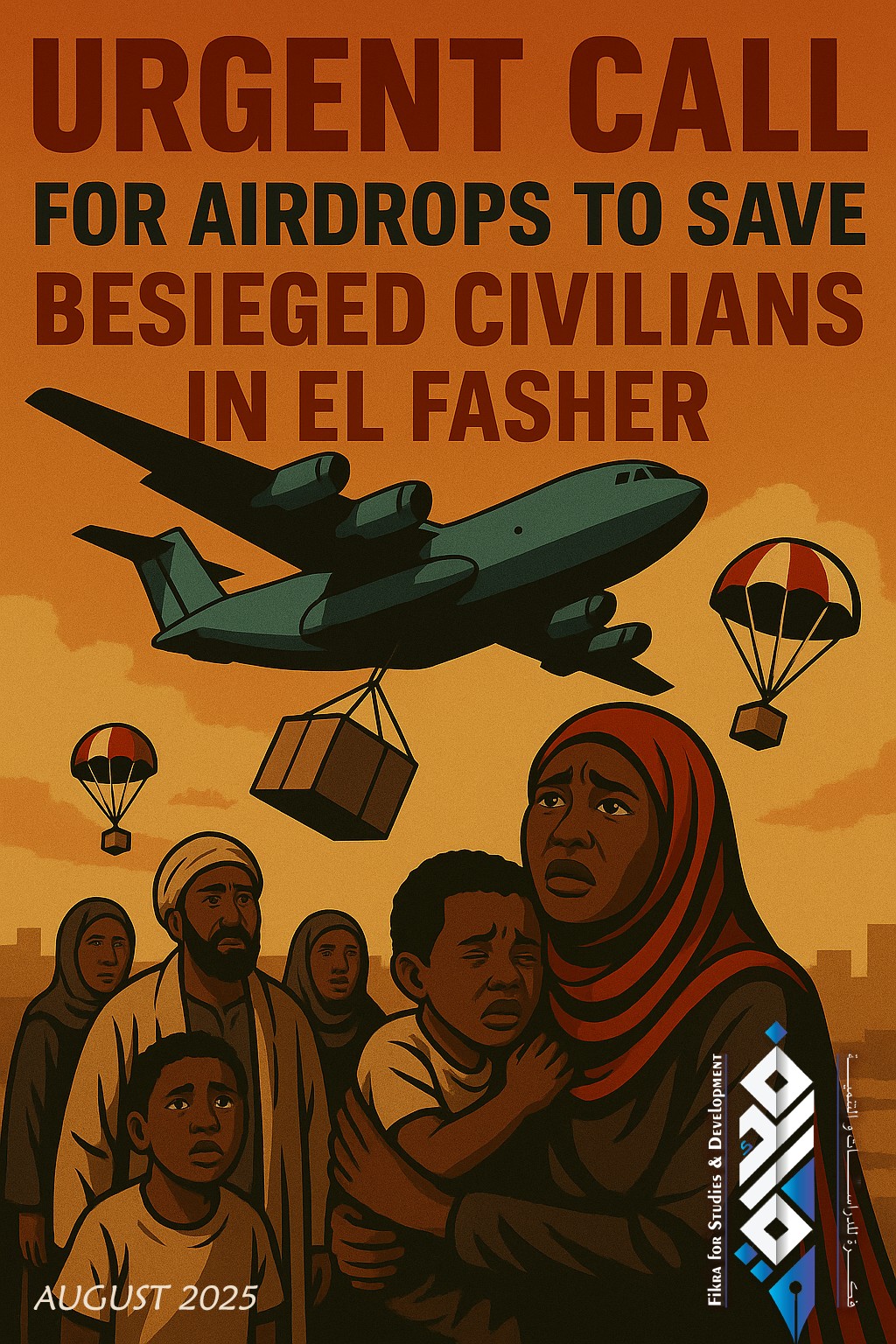Urgent Call for Airdrops to Save Besieged Civilians in El Fasher
Fikra for Studies and Development (FikraSD)
Urgent Call for Airdrops to Save Besieged Civilians in El Fasher
26 August 2025
Airdropping essential supplies to the besieged city of El Fasher is not a last resort—it is the only viable option currently available to sustain the lives of nearly one million civilians trapped there amid a deliberate humanitarian catastrophe.
Since May 2024, the Rapid Support Forces (RSF) militia has imposed a brutal siege on El Fasher, the capital of North Darfur, severing all supply lines and blocking humanitarian access. According to recent United Nations assessments, acute malnutrition affects over 45% of children under five in the area, with 11% suffering from severe acute malnutrition—a crisis that has doubled in severity over recent months. Desperate families are resorting to consuming animal fodder and food waste to survive, as famine conditions, confirmed by the Integrated Food Security Phase Classification (IPC) over a year ago, continue to ravage the population. The World Food Programme (WFP) has been unable to deliver aid by road for more than a year due to RSF blockades, and multiple humanitarian convoys have been looted or attacked, exacerbating the engineered starvation.
The situation has deteriorated further following the RSF’s invasion of the nearby Zamzam camp for displaced persons (IDPs) (which was hosting no less than half a million IDPs) on April 11, 2025, which they have transformed into a military base for foreign fighters, including Colombian mercenaries and others, using it as a launchpad for assaults on the city. This escalation, combined with ongoing attacks—as evidenced by the killing of at least 89 civilians between August 11 and 20, 2025, in El Fasher and the adjoining Abu Shouk camp—underscores the RSF’s systematic targeting of civilians.
In this dire context, airdropping aid to El Fasher is not merely an option; it is the sole mechanism by which the international community can fulfill its humanitarian responsibility and solemn commitments under the Responsibility to Protect (R2P) doctrine. R2P must not be narrowly confined to military interventions that conflict with sovereignty; rather, it should be embraced as a global humanitarian obligation to take all necessary actions to safeguard civilians and non-combatants from atrocious crimes, including induced famine being utilized as a weapon of war. Until recent months, the Sudanese government conducted airdrops of humanitarian supplies to El Fasher, but these operations have been halted by anti-aircraft weaponry supplied to the RSF by external actors.
On June 27, 2025, the UN Secretary-General proposed a week-long humanitarian truce to enable safe aid delivery to El Fasher—a reasonable and urgent measure promptly accepted by the Government of Sudan. Yet, the RSF flagrantly ignored this call, rejecting it outright. Compounding this, on August 18, 2025, Sudan’s Prime Minister sent an urgent letter to the UN Secretary-General, demanding immediate action to relieve the besieged population of El Fasher and end this man-made famine framing it as a “moral test” for the international community. These developments strip away any remaining pretext for inaction by the United Nations and the broader international community, who must now act without delay to resolve the crisis. Allowing the RSF and its backers to perpetrate starvation as a weapon of war without consequence is not acceptable.
It is unconscionable to leave the civilians of El Fasher as hostages to the RSF’s agenda. This man-made famine is a deliberate tactic employed by the RSF to achieve political and military objectives, and it must not be tolerated. The international community must cease its empty rhetoric and ineffective political maneuvers, which have yielded no tangible results thus far, and confront its moral and legal duties head-on.
FikraSD Proposes immediate and sustained aerial bridges for the delivery of food, medical, and humanitarian supplies to the besieged civilians in El Fasher.
Specifically, we call upon the United States, the European Union, and the United Kingdom who championed the discourse about the humanitarian crisis in Sudan in addition to the United Nations, and its relevant agencies spearheaded by the WFP and the United Nations Humanitarian Air Service to initiate regular airdrop operations without delay, providing no less than 4700 metric tons of essential supplies weekly. These must include nutrient-rich foods, medications to combat acute malnutrition, clean water, and other life-saving items. Furthermore, we urge the imposition of immediate, targeted sanctions on any external actors supplying anti-aircraft weapons or logistical support to the RSF, in line with UN Security Council Resolution 2736, to dismantle the networks prolonging this humanitarian disaster.
Proposals to force civilians to evacuate from El Fasher amount to forced uprooting from their homes into an uncertain fate, contributing to the world’s largest displacement crisis. Recent events have demonstrated that the RSF is actively hunting down and executing civilians attempting to flee the city on ethnic grounds, rendering such evacuations not only impractical but complicit in further crimes. The flawed logic behind these proposals is effectively normalizing the use of starvation of civilians as a tool of war. The international community must reject this distorted logic outright and refuse to treat El Fasher’s residents as hostages and bargaining chips in the RSF’s hands. The time for decisive action is now—lives hang in the balance, and history will judge those who fail to act.
FikraSD strongly criticizes the international community’s inaction and its troubling inclination to entertain the RSF’s flawed discourse, which prioritizes politics over urgent civilian protection and effectively endorses the use of starvation as leverage. This hesitation has prolonged unnecessary suffering and emboldened perpetrators of atrocities. The RSF and its backers must face swift and severe consequences for their deliberate starvation of civilians, including accountability through international judicial mechanisms for violations of international humanitarian law.
International actors who have uninvitedly entangled themselves in Sudan’s crisis must recognize that this is no moment for caution or hesitation. Starving Sudanese children and civilians cannot carry the crushing weight of international inaction. The choice is stark and unforgiving: either act decisively now, or remain forever silent under the enduring shame of having witnessed, and tolerated, a preventable tragedy.
Fikra for Studies and Development


